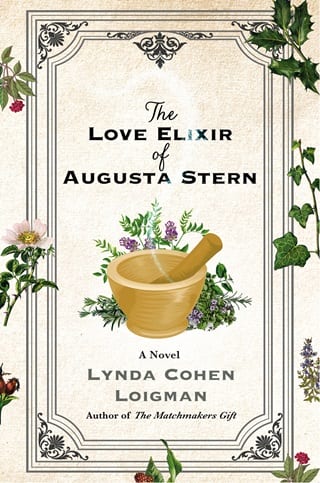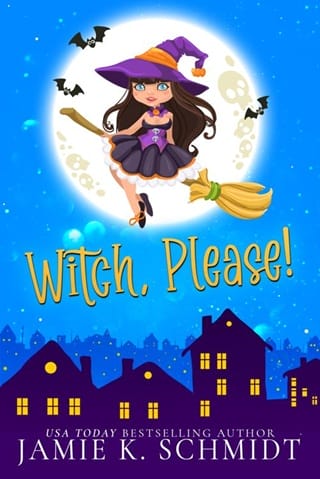Chapter Twelve
TWELVE
MAY 1923
The harsh Brooklyn winter turned to spring. The dogwoods exploded on Pitkin Avenue, and everything everywhere was in bloom.
After Irving’s full recovery, everyone forgot about the soup. Augusta’s father didn’t discuss it. Esther never brought it up again. Irving couldn’t even remember Esther feeding him from the jar. Only Augusta had lingering questions—questions that her great-aunt pretended not to understand.
It was true that Irving had gotten well. But neither the doctor’s care nor her father’s pills had brought about her friend’s recovery. That, she sensed, had been the work of Esther, by means of a process Augusta still did not entirely understand.
When she tried to discuss it with her sister, Bess told her not to be ridiculous. “So Aunt Esther put some extra herbs in the soup. That’s where medicine comes from, right? From plants and herbs and flowers and things? I don’t see why you’re so confused. I thought you knew all of that already.”
Augusta struggled to explain. “That’s not the confusing part,” she said. “It was the way Esther looked with all her hair down, the moonlight streaming in through the window. The air in the room felt different, Bess. It felt electric somehow, like it was plugged into something. And the song she was singing—the tune and the words—it wasn’t anything I’d ever heard.”
Bess rolled her eyes. “So what are you saying? You think it was some kind of magic ? You think Aunt Esther is a witch?”
Stated out loud, it sounded absurd. “Of course not,” Augusta protested. “But I’ve watched her make soup a hundred times, and I’ve never seen her do what she did that night. And the way she behaved at Irving’s house… so insistent that he eat it right away. I thought his mother was going to throw us out.”
“Look, it doesn’t matter what made Irving better. The important thing is that he’s well.”
“I know. But, Bess, I keep on wondering… what if there was something else that Mama could have taken? Something that would have made her better, too?”
Bess glared at Augusta with a feral intensity, as if she had crossed some invisible line. It was one thing to contemplate Irving’s illness and their great-aunt’s role in his recovery. But to suggest that their mother could have been saved so easily—to imply that her suffering might have been avoided if only they’d had the right powders or prayers—was an affront that Bess could not bear.
“The only medicine that could have saved our mother was discovered after she died. Nothing but insulin could have made her well.”
Augusta knew better than to contradict her sister, so she kept her thoughts to herself. Nothing that we know of, at least.
Meanwhile, it wasn’t just the dogwood trees that were blooming along their block. A neighbor a few doors down had triplets. The eggs in the nest on the firehouse roof hatched all at once in the first week of May, filling the slowly warming air with the trill of early morning birdsong. Dandelions pushed up through cracks in the sidewalk, and even the cat in the alley had kittens.
For one loyal customer—Harriet Dornbush—the kittens were the final straw.
It began one rainy Saturday morning when Augusta found the mother cat scratching at the store’s back door. Augusta brought her in from out of the wet and arranged the five kittens in a shallow cardboard box on top of a threadbare yellow towel. She left the box behind the register, where the customers could see them.
When Mrs. Dornbush arrived at the pharmacy, she purchased a bottle of Dr. Platt’s Cal-Rinex capsules, two cakes of soap, a bottle of talcum powder, and a box of twelve Kotex from the new store display.
Augusta estimated that the soft-spoken Mrs. Dornbush was somewhere between her late twenties and early thirties. There was nothing particularly unique about her, except for one specific detail: Mr. Dornbush, her husband, was a traveling shoe salesman, and while he was often on the road, leaving his wife alone and lonely, she reaped the benefits of his occupation with a collection of the most stylish footwear anyone in the neighborhood had ever seen. On that spring day, neither Bess nor Augusta could pry their curious eyes away from the two-tone, one-strap, brown kid shoes currently clacking across the pharmacy floor. The shoes were pointed at the toe, with a sleek Louis heel and a striking blond patent leather trim. Both girls were so busy admiring them that neither of them noticed the tears that had formed in the corners of Mrs. Dornbush’s eyes.
It was when Bess rang up the box of Kotex that Harriet Dornbush broke down entirely. She pointed to the cardboard box. “Even the cat is a mother,” she cried, sobbing. Augusta’s father came out from the prescription room to see what the fuss was at the register. When he saw how upset Mrs. Dornbush was, he guided her gently into the quiet back room. “Please, have a seat, Mrs. Dornbush,” he said, pointing to the chair in which Augusta usually sat to do her homework. “Augusta, go ask George for a glass of seltzer water and bring it back here, will you, please?”
When she returned to give Mrs. Dornbush the seltzer, Augusta understood from the bits she overheard that the woman was explaining her struggle to have a child. It seemed an awfully personal thing to discuss, but then again, Augusta knew that customers trusted her father with their secrets. And it wasn’t as if this was a secret exactly. Everyone knew the Dornbushes had no children.
“We’ve been married for seven years now,” said Harriet. “We’ve seen all the specialists in the city, but nothing we try seems to work.”
Augusta’s father nodded sympathetically. He didn’t seem the slightest bit squeamish or uncomfortable with the conversation. Most men would have steered away from the subject as quickly as courtesy would allow, but Solomon Stern spoke as easily to Harriet as if they were discussing a rash on her elbow. When he remembered that Augusta was still in the room, he told her to return to the front of the store. Eventually, both he and Mrs. Dornbush emerged from the prescription room. On the way out, Mrs. Dornbush asked Augusta what she was planning to do with the kittens.
“You can have one if you like,” Augusta told her. “They should be weaned by the end of June. My friend Evie is taking one, but the rest are all available.”
Mrs. Dornbush gave her a tender smile. “I’ll think about it,” she said.
Later, when Augusta asked her father whether any of his medicines could help the woman, he shook his head and frowned. “The doctors haven’t found anything wrong with her. There’s nothing left for me to recommend.”
A month later, Mrs. Dornbush came in again for another bottle of Cal-Rinex pills and another box of Kotex. This time, her shoes were a front-strap model in black patent leather, ornately trimmed with rose-blush patent on the vamp and the back of the heel. In contrast to her colorful footwear, Mrs. Dornbush’s complexion was a waxy gray. Dark circles bloomed beneath her eyes, and she looked as if she hadn’t slept in weeks. When she asked to speak with Augusta’s father privately, he led her to the prescription room and motioned for Augusta not to follow. When Mrs. Dornbush emerged a few minutes later, tears streamed down her ashen face. She bolted out of the store so quickly that she forgot to take her purchases with her.
Augusta went looking for her father in the back room. She held up Mrs. Dornbush’s bag. “She left these behind. Should I go after her?”
“No, Augusta. Leave her be for now. I’ll have Irving deliver them to her apartment tomorrow.”
“What happened, Papa? Why was she so upset?”
“She asked me for arsenic,” said her father, raising a single eyebrow. “To lighten her complexion.”
Augusta was familiar with arsenic, but she knew her father rarely sold it. “But Mrs. Dornbush is so pale already. Why does she want—” The truth struck Augusta in the middle of her sentence. “Oh,” she said softly. “And you wouldn’t give it to her.”
Her father nodded solemnly. “You’re old enough to understand these things now. It’s no use pretending about it. Dispensing drugs is a complicated business, but arsenic is particularly tricky. The drug itself is useful, of course—for syphilis and other ailments. Good for killing rats, too, come to think of it. But if a person takes too much, the results could be… tragic.”
Augusta tried not to think about what Mrs. Dornbush might have done with the arsenic. She tried to wipe the image from her brain, of Mr. Dornbush returning from his business trip and finding his wife on the bed or the floor, her body still, her eyes shut tight…
Her father knew what she was thinking. “Being a pharmacist is more than filling prescriptions,” he said. “I told you once that sometimes it means keeping other people’s secrets. But it can also mean protecting people from themselves. We have to know our customers as well as we know our family. We have to know when they aren’t being honest with us.”
“How can you be sure that Mrs. Dornbush was lying?”
“No one can ever know for sure. But I’ve learned to trust my instincts.”
“What if she tries to get arsenic somewhere else? From another pharmacy, where they don’t know her as well?”
Augusta’s father shook his head. “She won’t,” he said adamantly. “She was too embarrassed when I confronted her. Also, I made sure to tell her that no one else in the neighborhood would sell it to her.”
“Is that true?”
“Probably not. But for now, at least, she believes it is. I’ll talk to her husband when he’s back from his trip.”
“And there’s really nothing you can prescribe that might help the two of them have a baby?”
“The doctors and I have done all we can.”
Augusta nodded solemnly, but she couldn’t help wondering whether it was true. After all, both her father and Dr. Birnbaum had said the exact same thing about Irving.
That night, after everyone was in bed, Augusta lay awake thinking about Mrs. Dornbush. The words her father spoke when he first explained his work echoed loudly inside her head. Whatever you hear, whatever you learn about a customer, is never, ever to be repeated. If you break this rule, there will be no second chance.
Augusta had promised him she would comply. She knew Mrs. Dornbush’s condition was sensitive, and she would never want to betray the woman’s trust. But this was a far more complex case than any Augusta could have contemplated. What was Augusta’s duty to Mrs. Dornbush, or to anyone, in such a situation?
By now Augusta had grown accustomed to sharing her small bedroom with Aunt Esther. She was used to the sound of her great-aunt’s breathing, used to the snores from that side of the room after her aunt had fallen asleep. Now she could tell from the silence that Esther was still awake.
“Aunt Esther?” said Augusta, into the darkness.
When there was no answer, she tried again. “I know you’re up,” Augusta said. “Please, I have something I want to ask you.”
From a few feet away, there was a rustle of blankets, but still no acknowledgment that Esther was listening.
“Fine,” Augusta said. “Pretend if you want, but I know you can hear me.”
When her aunt still did not answer, Augusta took a deep breath and began.
“Mrs. Dornbush came into the store today. Do you remember who she is? She’s the quiet woman with the beautiful shoes. Anyway, last month, Papa spoke to her privately for a bit after she started crying at the register. She told him she’s been trying to have a baby ever since she got married, which means they’ve been trying for seven years. The doctors say there’s nothing wrong so there’s nothing to be done.” Augusta paused to listen for a response, but she couldn’t hear anything in the darkness, not even a change in the old woman’s breathing.
“I’m sure some people don’t get sad about not having children,” Augusta continued. “Some people don’t want any. I mean, you don’t have any and it doesn’t seem to bother you at all. But Mrs. Dornbush isn’t like that. She cried when she saw the alley cat’s kittens. And today, something much worse happened. Today, she asked Papa for arsenic, only she didn’t want it for her complexion.” Augusta stopped herself again, but there was still no answer from Aunt Esther.
“Papa says she won’t ask another pharmacist for the powder. He says he’s going to have a talk with her husband. But I’m worried that won’t be enough. I’m worried she’s going to try again.” Augusta choked back a sob. “When she left today, she seemed so desperate. Aunt Esther, she looked like a ghost.”
Aside from the echo of her own words, the room was painfully silent. Was it possible that Esther really was asleep? Darkness enveloped Augusta on every side. She rolled over onto her stomach and closed her eyes.
At some point, she must have fallen asleep, because the next thing she knew, Aunt Esther’s voice woke her, rousing her from a bottomless dream. In the dark, the voice was more substantial—it had a weight and a heft that it lacked in daylight.
“Goldie,” she whispered. “Little Goldie… I see how you tend to your father’s headaches. I hear how you share the pain of this stranger. You have the heart of a healer. Together, we will try to help this woman. Together, let us see what we can do.”
 Fullepub
Fullepub 



